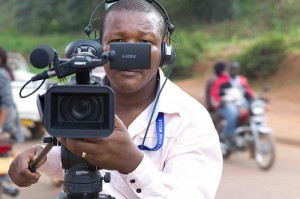Producing compelling African stories
Turn around and you will find a story to tell. That’s what DW-Akademie’s new journalism training project African Stories is all about: African journalists telling African stories and taking a closer look at their society.
 In short, the project aims to train journalists to produce interesting and professionally produced TV reports and documentaries – offering their audience an African perspective on a number of issues ranging from environmental protection, economic development and governance to poverty reduction, health and education.
In short, the project aims to train journalists to produce interesting and professionally produced TV reports and documentaries – offering their audience an African perspective on a number of issues ranging from environmental protection, economic development and governance to poverty reduction, health and education.
African Stories is also ambitious in scale involving broadcasters from across the continent. Television stations participating in the project send a production team to attend a two-week training course. The reports produced by each team during the training are in turn made available to all of the participating broadcasters.
To give you a better idea of the project, here are some stories produced during the recent workshop in Kampala in June.
Street Entrepreneur – Team Kenya
Annet Tinkamanyre sells tea and coffee during the morning. At midday she cleans shoes. She’s just one of thousands of people earning their living on the streets of Kampala. Someone you could easily walk past, but someone who has a very interesting life story to tell. Our journalists Wilkister Nyabwa , Halima Mwiwa Khayundi and Joseph Njagi Kariuki, all from Kenya, set out to accompany Annet, document her daily routine and find out more about her life and her business ambitions.
For our journalists, that meant a very early start! Annet begins her day at two o’clock in the morning preparing what she needs for selling hot drinks. A special mixture of aromatic spices is the recipe of her success. But interestingly, Annet completely changes her business during the day to collect and clean shoes. Our journalists discovered that within only three years Annet has built a business from nothing and now employs 17 people. Annet’s goal is to start her own juice factory. Is she potentially a Ugandan Richard Branson? Take a look at the full story our journalists produced to find out more about a very savvy and ambitious businesswoman.
Sanitation in the Slums – Team Uganda
Our trainee journalists from Kampala, Nali Norah Rita, Stephen Ofumbi and Fredrick David Lutakome, decided to head into a city’s slum and work on a story about something we all need: toilets; or more specifically, the lack of adequate hygiene and sanitation in the slums. It’s a huge health problem the residents face.
Just the smell is confronting. But this is life for thousands of families living in huts built with whatever is at hand. Garbage is everywhere. As for going to the toilet, well a little stream running in front of the huts says it all. For our journalists trying to produce a television feature it was challenging conditions for filming and to work quickly and efficiently.
The team examined how the German Development Corporation (GIZ) is helping people to acquire a simple but necessary facility of everyday life: a toilet. It is a initiative of the local NGO Sustainable Sanitation and Water Renewable(SSWARS). Some of the latrines even have a shower. The video which Norah, Stephen and Fredrick produced shows the real difference the new latrines are making in the local community.
Boda-Boda Queen – Team Tanzania
In the centre of Kampala, Paul Charles Mabuga, David Julius Ngahyoma and Emmanuel Mkina Makwaya from Tanzania found a great story of a woman succeeding in a men’s world.
Anyone will tell you traffic is a nightmare in Kampala. Anything and everything on wheels is on the roads. Small motorcycle taxis also dart their way between the cars and trucks. These boda-bodas are one of the most popular forms of transport in the city. The team discovered Monica, an energetic woman who has developed a business from the boda-bodas. She leases motorcycles to young men, all of them school dropouts. They work for her as drivers and slowly pay off their two-wheeled taxis. Monica owns 17 motorcycles and plans to expand her business operation. As you’ll see in the story she is a happy, hard working woman thriving in a world traditionally dominated by men.
It’s certainly a steep learning curve during the courses but many of our trainees are coming away from African Stories instilled with new skills and confidence to tell better stories. Journalists/producers are discovering better ways of planning, producing and scripting their stories while camera operators and editors are dramatically improving the technical qualities of their productions. Together they’re going back to their stations as a stronger team and hopefully will share new knowledge and skills with their colleagues. Let us know what you think of these stories. Our participants would appreciate your feedback!
Author: Rodrigo Villazú
Rodrigo Villarzú is the DW-Akademie Special Projects Coordinator of the Africa Division. DW-Akademie has conducted African Stories courses in Kampala, Rabat, Cape Town and Dakar, and courses will be held, amoung others, in Accra, Bamako, Brazzaville and Porto Novo later this year.




Feedback